Russian Characters
Primarily set in Russia,
The Scarlet Empress and
Knight Without Armour portray more Russian characters than any other Dietrich flick, with an emphasis on the tensions arising from these characters' political leanings and social status. Taking on 18th century Russia,
The Scarlet Empress includes noble Russian officers, mustachioed and with long flowing hair, who don fur caps and military orders as they ride tall horses. The clergy wear long beards and robes, swing incense burners, and swish aspergilla. Occasional scenes of the peasant masses show them in headscarves and fur caps, reacting to every event related to the imperial family.
As for the imperial family, its reeks of idiosyncrasy. Reigning with a down-home approach, the
Empress Elizabeth (Louise Dresser) eschews protocol during preparations for
Sophia Fredericka's (Dietrich) wedding to Elizabeth's nephew, the
Grand Duke Peter (Sam Jaffe), by telling Sophia Fredericka's ladies-in-waiting not to bother bowing to her and by removing her rings to fix Sophia Fredericka's hairstyle herself. The matter-of-fact Elizabeth later dismisses Austrian and French ambassadors with whom she is to dine because she finds that diplomatic functions "lead to nothing," urging the young officers around her to take their place at the table.
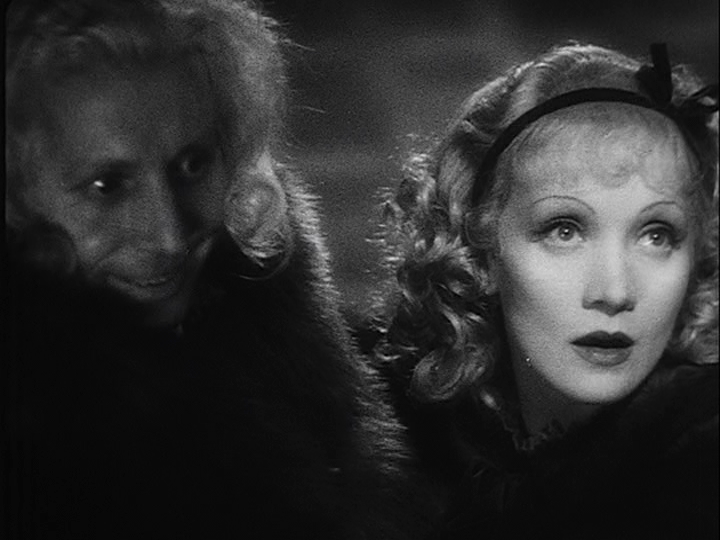 |
| Sophia Fredericka/Catherine's strange spouse, Peter |
Unlike his aunt, Peter uses his social status to indulge in oddball hijinks, sometimes entering palace chambers with an entourage of dwarves, dogs, and mistress and sometimes marching through palace halls with Hessian troops. Furthermore, the wild-eyed Peter plays with toy soldiers and drills holes through walls to peep at the palace's occupants, never bothering to endear himself to the powerful nobility and clergy as his aunt does. By the time he becomes Tsar, Peter ultimately prompts these groups to rebel against him by slapping the
Archimandrite/Arch-Episcope Simeon (Davison Clark) during a traditional call for alms and ripping
Captain Gregori Orloff's (Gavin Gordon) orders off his jacket.
Amidst World War I and the Russian Revolution,
Knight Without Armour details the clash between the Bolshevik "Reds" and the imperialist "Whites."
Countess Alexandra Vladinoff (Dietrich) represents the latter faction, enjoying privileges such as visiting a horserace abroad in Ascot, receiving the Russian Tsar's congratulations for her engagement to
Colonel Adraxine (Austin Trevor), and--after marrying Adraxine--lounging around her palatial estate, summoning servants to attend to her every whim with the ring of a bell. Meanwhile, her servants huddle together in the kitchen, reading about the revolutionary cry to "wipe out the bourgeois and aristocrats from the face of the earth."
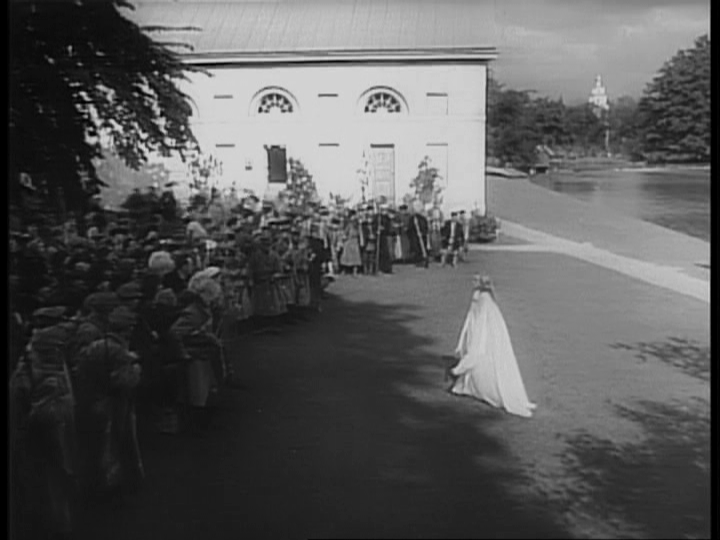 |
| Countess Alexandra confronting a peasant mob |
Even though she seems to live blithely as war and revolution erupt, Alexandra has already narrowly escaped an assassination attempt when a Bolshevik tossed a bomb at her wedding procession and has already become a widow after her husband went to war. Eventually, she confronts her opponents head-on when she struts toward an angry mob of peasants who have invaded her estate, taunting them with the words, "What are you waiting for?" The Tsarist social order falls apart before her eyes as two elderly women in headscarves grab her and a Red soldier snatches a piece of her robe, mockingly tying it around his neck like a scarf. While Alexandra is held prisoner in her library, the peasants loot her home and destroy its artwork, and one of her loyal servants caught trying to run is taken to be executed.
Once Soviet commissar
Axelstein (Basil Gill) arrives, some order is restored. Formerly a bookseller, Axelstein grounds the Revolution in intellectual rhetoric, reprimanding a Soviet soldier for letting the peasants "[destroy] the property of the people." His assistant
Peter Ouranoff (formerly known in the film as A.J. Fothergill, and played by the actor Robert Donat) checks on Alexandra, who shouts at him, "I hate you all! I despise you! You're Red vermin! Long live Russia! Long live the Tsar!" Like Axelstein, Ouranoff keeps a cool head and persuades Alexandra to let him escort her to Petrograd, but an unlikely alliance ensues between the two as love conquers their emotions.
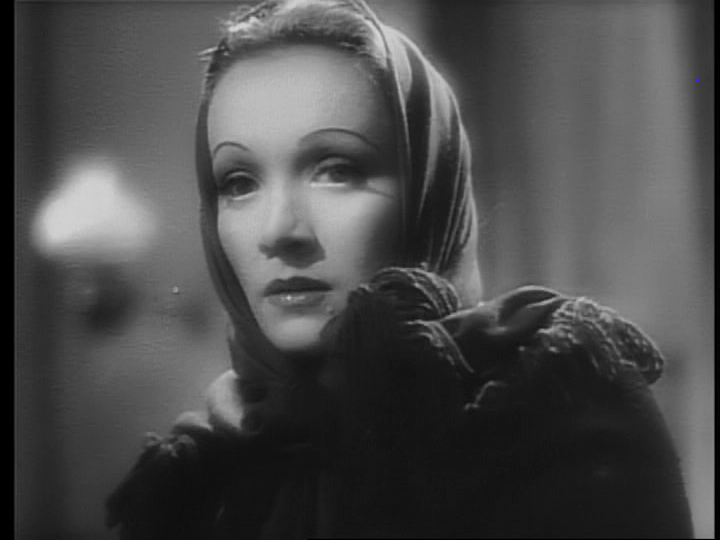 |
| Countess Alexandra in peasant drag |
Through various disguises, Alexandra manages to survive during her flight from Russia. Ouranoff helps her leave her estate without being "[torn] to pieces" by the Bolshevik mob by finding a peasant woman's outfit for her, complete with a headscarf. Ouranoff later comes to Alexandra's rescue by putting her in a soldier's uniform the second time the Reds apprehend her. Fortunately and unfortunately for her, costumes can only camouflage so much. When Alexandra arrives at a White-run town, she demands to speak to the commanding officer, who immediately recognizes her and refers to her "Sasha" as if she were a relative or family friend, providing her with a bath, the best room in the inn, and a choice of gowns. On the other hand, Alexandra's soft hands expose her aristocratic background at a Red checkpoint in Kazan, leading a keen guard to identify Alexandra from a photograph. Thanks to perhaps an ingrained fealty, a former gardener of Alexandra's who has found work at the checkpoint spares her from a firing squad by pretending he doesn't recognize her.
Despite the opposition between the Reds and the Whites, they share inherent similarities as a Russian people. At a town captured by the Whites, the victors perform folk dances in the street to accordion music. After the Reds wrest control, its victors replicate this revelry. The town's sycophantic innkeeper accommodates the needs of whatever faction that rules, addressing the White captain as "your Excellency" and later a Red trooper as "comrade." One Red fighter observes to Ouranoff, "Soldiers are soldiers. White or Red, they're no different." Earlier in the film, when Ouranoff and Alexandra await a train to Petrovgrad, Alexandra sums up her view of her people, regardless of politics, with a poem that she calls "hopeless and pessimistic like we Russians." Indeed, the half-Russian, half-French Boris
Androvsky (Charles Boyer) embodies this morose attitude by pouting throughout another Dietrich film,
The Garden of Allah, although his demeanor seems more influenced by his guilt for abandoning his Trappist monastic vows, a decidedly non-Russian vocation.
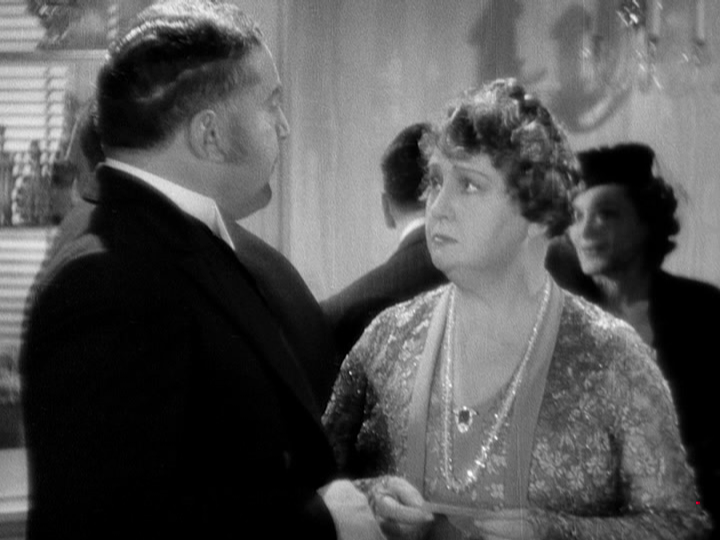 |
| Dowdy Grand Duchess Anna Dmitrievna |
A Russian penchant for hopelessness and pessimism is not, however, apparent in
Dishonored's
Colonel Kranau (Victor McLaglen) and
Angel's
Grand Duchess Anna Dmitrievna (Laura Hope Crews), neither of whom would otherwise register as Russian due to their Transatlantic accents. As a spy during World War I, Kranau naturally must not betray his Russian identity, explaining to rival Austrian agent
X-27 (Dietrich), "I'm a colonel in the Russian army and when necessary I fly across the line and play the clown or the Austrian officer." Instead, he asserts his Russianness through patriotic acts and declarations, telling X-27 after he burns her musical composition encoded with military secrets, "I destroy everything that's dangerous to Russia." Even after being captured and identified from a photograph like
Knight Without Armour's Alexandra, Kranau doesn't succumb to disillusionment and--when X-27's clumsiness provides him an opportunity--he climbs out of a window to steal one of the planes outside. Looking more Russian in his astrakhan hat and military uniform than he ever did earlier in the film, his risk surprisingly appears to pay off as the rumbling of an off-screen plane suggests flight.
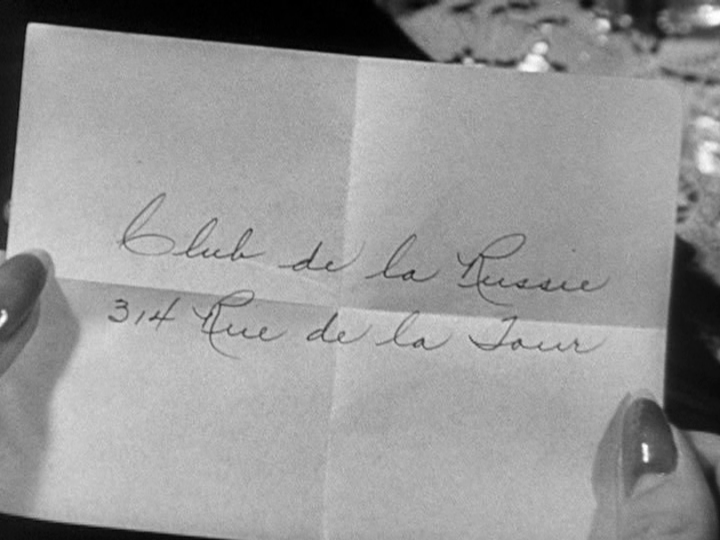 |
| The address to "Club de la Russie" |
Regarding
Angel's Grand Duchess, a well-dressed yet dowdy matron, she may lack any distinct Russian traits, yet her surroundings act as markers of her identity, her servant speaking with what could pass as a vaguely Slavic accent, her escort service being the "Club de la Russie," and her address plaque decorated with double-headed eagles. One of her clients observes, "If it hadn't been for the Revolution, the Grand Duchess would still be in Russia instead of providing us with such a delightful salon," which speaks of the lady's ability to etch out a living despite being ousted from her native country by the Bolsheviks.
Russia and Russians, According to Non-Russians
To supplement these Russian roles, the directors of Dietrich's pictures as well as their non-Russian characters also express their impressions of Russia and Russians. At the beginning of
The Scarlet Empress, a tutor gives the
young Prussian princess
Sophia Fredericka (played by Marlene's daughter, Maria Riva) a lesson on Russia's "hangmen" Tsars and Tsarinas that dissolves into a montage chiefly of women in various stages of undress tortured by men. Later, when the deranged Peter inherits the Russian throne, he issues a series of proclamations shown in a second montage that corroborates the brutality of the first, with scenes of peasants being shot, peasants fleeing from horsemen, a soldier attacking a shirtless woman, soldiers dragging peasants from a cabin, soldiers looting coins from under a floorboard, and a man being tied to bars in a crowded dungeon. This second montage may not represent ideas of Russia and Russians espoused by any of the film's
credited non-Russian characters, but if one considers the Austrian-born director
Josef von Sternberg's omnipotent presence in
The Scarlet Empress, one might regard him as one of the film's
uncredited actors.
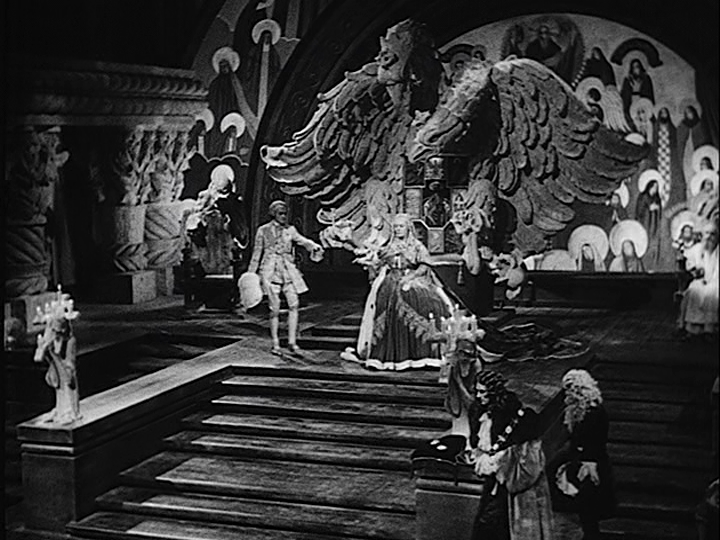 |
| Empress Elizabeth nesting in her throne |
Sometimes, von Sternberg resorts to conventional images of Russia such as snow, iconography, Orthodox crosses, and onion domes. His overall presentation of the Russian Imperial court, however, embodies a singular aesthetic. A double-headed eagle statue hovers over the throne in which Empress Elizabeth presides as if she is its chick, and the disjointed scale becomes more apparent when the camera zooms out. Opening palace doors requires group effort, the court's ladies-in-waiting practically stretching their arms out of their sockets just to reach the handles. Ghoulish statues, some pierced with arrows, lurk in every corner. A human skeleton atop a dinner table fazes none of those feasting in honor of the imperial wedding.
Editorializing Russian history and culture not only with images, von Sternberg also verbalizes a biased perspective in the title cards, which inform viewers that "Peter III terrorized Russia" and characterize Russia as "a vast empire that had built its foundations on ignorance, violence, fear and oppression," a land "where the populace hid behind closed shutters--out of the way of the feared Cossacks, who with reckless fury protected their nobles from even a glance of the enslaved people."
 |
| Fothergill/Ouranoff and Axelstein's Siberian cabin under snow |
Directing
Knight Without Armour with more subtlety, the Belgian
Jacques Feyder envisions a wintery Russia before the Reds launch a full-on uprising, where Alexandra's wedding procession is interrupted on icy streets and Ouranoff and Axelstein get banished to a Siberian cabin buried to its roof in snow. Ouranoff moans that it is "night all the time," yet Axelstein assures him, "The Imperial Army is sure to be defeated. Perhaps even now the war is over. Russia's fate is in the hands of her own people. There's bound to be a revolution." Trains may not be running on time after the peasant movement, but seasons at least seem to change with the politics. After being liberated from Siberia, Ouranoff and Axelstein sail on flowing water, and Alexandra's estate boasts lush trees when the proletariat overtake it. At a later point in the film, Ouranoff conceals Alexandra under a pile of autumn leaves to evade the increasingly powerful Reds.
 |
| Countess Alexandra concealed by autumn leaves |
In Dietrich's films set far from Russia, Russia and Russians still arise as topics of conversation.
The Flame of New Orleans'
Charles (Roland Young) asks his fiancé
Claire (Dietrich) whether she has visited St. Petersburg, to which she responds, "Oh, no. It's much too cold, and I don't like Russians." An English valet and English manservant
(Edward Everett Horton and Douglas Ernest Cossart, respectively) in
Angel discuss Soviet delegates at a dinner who were "properly dressed" in white tie and tails, yet "still dunk[ed]," an etiquette no-no in polite British society. After Kranau's capture in
Dishonored, X-27 insists on questioning him, despite an Austrian soldier's advice that "you can't make Russians talk." To contradict this notion of Russian reticence, Deputy
Tom Destry (James Stewart) observes that
Boris' (Mischa Auer) outburst at the end of
Destry Rides Again is probably the Russian way of expressing oneself.
Russian Caricatures
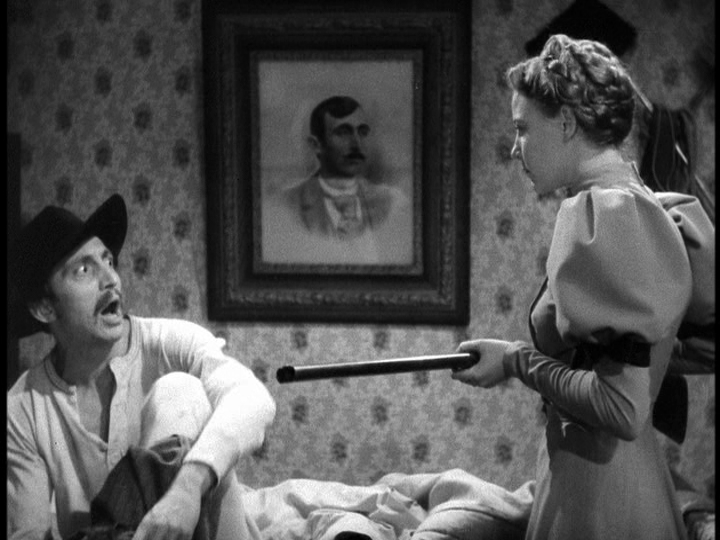 |
| Boris, wannabe cowboy? |
As one of the few native Russian actors to take on Russian roles in Dietrich's films, Mischa Auer uses his identity not to glorify his people but to provide comic relief, thus aiding to diffuse the sex appeal of the ambiguously French characters that fellow foreigner Dietrich plays. He first appears in
Destry Rides Again as Boris Alexandrovich Stavrogin, a wannabe cowboy better known as
Callahan, the surname of his ball-busting wife
Lily Belle's (Una Merkel) first husband, an upstanding buckaroo who died of unknown causes and whose portrait looms over Boris and Lily Belle's bed. According to Lily Belle, Boris is a "no-good Russian lummox. Frankly, the "lummox" part isn't far from the truth.
Despite his bad credit, Boris gambles with
Frenchy (Dietrich), who wants to put his pants on the table. Just before they finish their game, the newly-appointed sheriff
(Charles Winninger) arrives to tell Boris that his wife has commanded he return home to help with Destry's luggage. The emasculated Boris stands, ready to go because he's afraid his wife will "skin [him] alive," but Frenchy forces him to play her game. Boris begins babbling to himself in Russian, ultimately capitulating to Frenchy and losing his pants to her. The person who really wears the pants in Boris' household, Lily Belle, later comes to unsuccessfully reclaim her husband's lost garment.
Resorting to subterfuge, Boris steals the pants of a man several sizes larger than him in his wife's boarding house and tries to escape through the window, but Lily Belle catches him, berating him as a "misfit Cossack." Boris bemoans living under Callahan's shadow and says, "All I want to do is to be a cowboy and wear my own pants." Nevertheless, his aspirations don't stop him from attempting to purloin another man's pants, Destry's, who offers them to Boris only if Boris takes on the role as second deputy of Bottle Neck and uncovers the body of the former
Sheriff Keogh.
Working alongside Destry, Boris grows a backbone, although not one strong enough to keep him from being trampled by a mob of women. At the very least, Boris eventually manages to stand up to one woman, Lily Belle, stomping on the portrait of Callahan, replacing it with one of himself, and proclaiming "Boris Alexandrovich Stavrogin is the head of his house!"
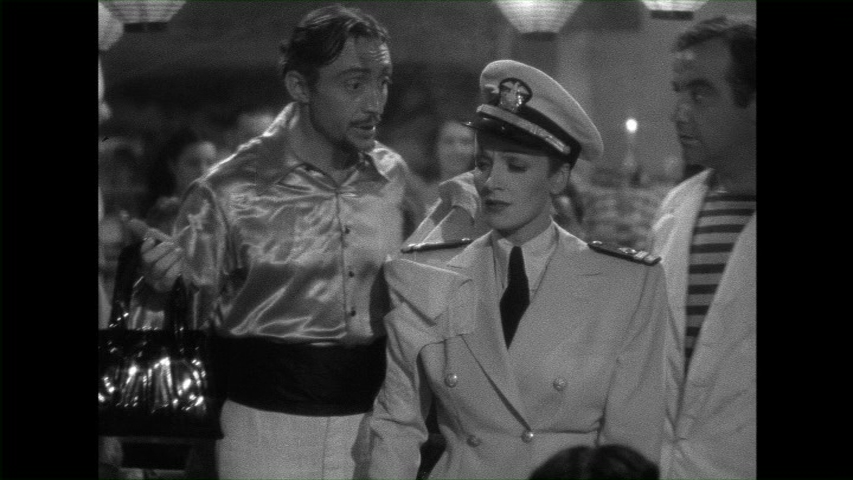 |
| Sasha, kleptomaniac magician? |
As
Bijou's (Dietrich) cohort in
Seven Sinners, Auer's character
Sasha works two jobs--magician and petty thief. Sometimes, Sasha's five finger discounts pay off, but Bijou disapproves of his kleptomania, frequently quashing his criminal acts or ordering him to return the stolen goods. As a magician, Sasha is less successful, accidentally setting a bird loose from his coat during his physical exam, burning a hole in the handkerchief of one of the guests at Seven Sinners café, and inciting the aggressive
Andro's (Oscar Homolka) ire by turning Bijou into Seven Sinners café owner
Tony (Billy Gilbert). Although Sasha is adept at hiding when brawls ensue over Bijou, he fails at his disappearing act when the authorities arrive, who always spot Sasha crawling away from behind a table. When he does put up a rare fight, he gets punched across the room and through a bar panel.
 |
| Zolotov, panty salesman from St. Petersburg? |
In
The Flame of New Orleans, Auer plays
Zolotov, a man from St. Petersburg who attends a party with his friend
Bellows (Franklin Pangborn), where he ogles the female guests. His eyes pop when he recognizes Claire, and after giving her a wink, he whispers to Bellows stories that he heard about Claire when she was in his hometown. The gossip spreads around the room to Claire's fiancé Charles, who becomes incensed enough to want to duel Zolotov. Later, Charles runs into Bellows and asks for Zolotov's whereabouts. Bellows relays Zolotov's dubious message that he is in hiding because dueling is against his religion and that he is in the diplomatic service of the Tsar. In the scene that follows, Zolotov is sitting with two women, employing his consular skills to convince them that he is an underwear salesman in St. Petersburg.
As much as Marlene would have wanted us to forget her silent film career, she made a film called
The Ship of Lost Men (Das Schiff der verlorenen Menschen) in which Russian actor
Vladimir Sokoloff plays a Russian cook named
Grischa. Like Auer's Boris, Sasha, and Zolotov, the diminutive Grischa lacks physical prowess, enduring beatings from his burly boss, captain
Vela (Fritz Kortner), and failing to keep marauding sailors out of his kitchen. Nevertheless, Grischa exhibits a strong character, insisting upon hiding Ethel (Dietrich) from the lusty ship crew and slipping a gun to a man of equal merit, the American doctor
Cheyne (Robert Irvine). Rather than sneak away from fights to save himself like an Auer character, Grischa escapes the riotous seamen to send light signals, which catches the attention of an ocean liner and leads to everyone's rescue.
Becoming Russian?
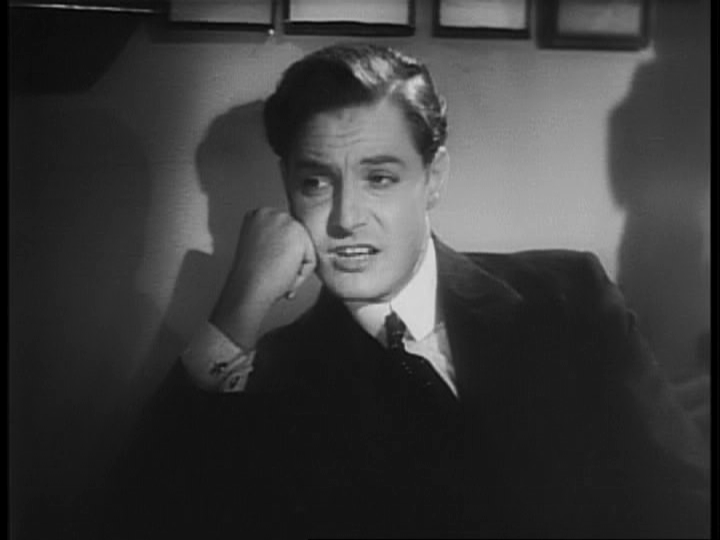 |
| Englishman Fothergill... |
Because
The Scarlet Empress and
Knight Without Armour mainly take place in Russian territory where Russian culture can exert a powerful influence, a phenomenon occurs in both films--Russification. In
The Scarlet Empress, Prussian princess Sophia Fredericka arrives to Russia, where almost immediately she must convert to Orthodoxy and adopt a name more fitting for a Russian, Catherine. Similarly,
Knight Without Armour's Englishman A.J. Fothergill assumes the identity of a Russian named Peter Ouranoff so that he can remain in Russia after a critical article he has written about the Imperial Court leads to his expulsion. Perhaps to pass as Ouranoff, he grows facial hair and finds himself entangled in the activities of Russian revolutionaries, which result in his two-year Siberian exile, where he suffers with fellow insurgent Axelstein. Once the Bolsheviks gain power and free Axelstein and Ouranoff, the two receive a hero's welcome and are greeted as fellow comrades. Whether he encounters Reds or Whites, Ouranoff can't shake his newfound Russian identity, finding himself either accepting a commissarship or escaping a firing squad.
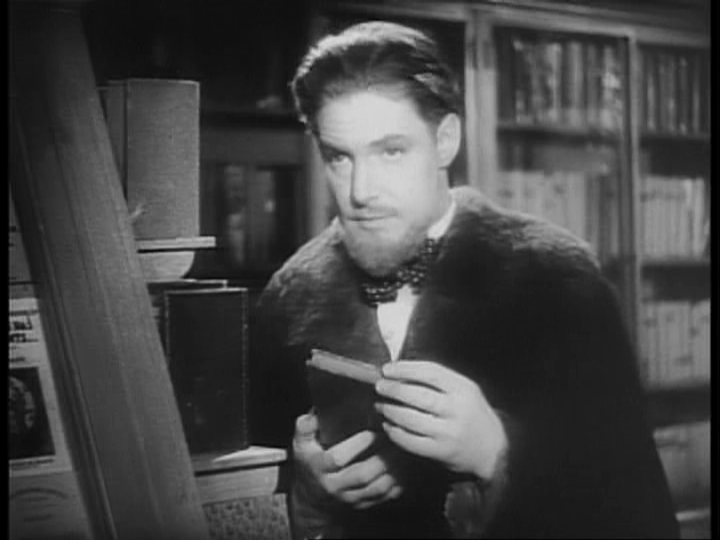 |
| ...becomes Russian Ouranoff |
For the newly baptized Catherine, assimilation occurs at a slower pace. Naïve and old-fashioned even for the 18th century, Catherine initially rejects
Count Alexei's (John Lodge) romantic overtures, insisting that she'll always be faithful to her husband because she isn't a Russian. It requires her mother's dismissal and her attachment to Empress Elizabeth's personal staff to "educate her and teach her what it means to be a Russian wife and how to accept the embraces of a husband like a Russian wife." Rather, Catherine must face heartbreak by witnessing Alexei enter Elizabeth's bedchambers, which induces her to adopt more libertine sexual attitudes and--rather than accept her husband's embraces--accept the embraces of any man in court willing and able to help her conceive a male heir and thereby secure her place in the Russian court.
Meeting with the clergyman Simeon, Catherine asserts, "Now that I've learned how Russia expects me to behave, I like it here. And I intend to stay, Grand Duke or no Grand Duke." Simeon hopes Catherine will conspire with him, but she does not wish to take advantage of his "political machine," to which Simeon replies, "I'm afraid you don't know Russians, my child." Catherine answers, "That's possible, Father, but I'm taking lessons as fast as I can." Proving to be an apt pupil, Catherine totally wins over the army when she inspects them and earns the clergy's respect by generously providing alms. During her coup d'état of Peter's government, Catherine is decked out like Russian soldier and rides a horse alongside them through the palace, ushered by clergymen upon her arrival at the conspirators' meeting place. Representing the military, Captain Orloff declares, "We soldiers in the service of the holy Russian empire do hereby solemnly swear to acknowledge and defend with our lives the authority of Catherine, our Empress, and to destroy her enemies," and Simeon offers the following blessing, "God grant you victory, Catherine. All Russia is waiting for the sound of our bell." Like Ouranoff, Catherine has earned the reverence of her Russian supporters, who embrace her as one of their own.
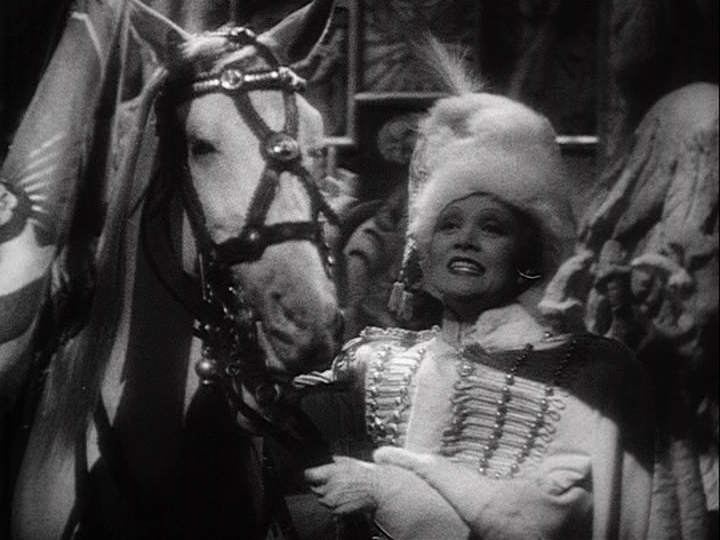 |
| Empress Catherine II, fully Russified |
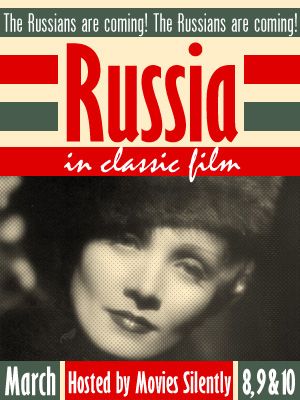















Thanks so much for this epic celebration of Dietrich's Russian-themed films! The Scarlet Empress is my favorite of her films but you are so right, von Sternberg may as well have appeared on screen. His presence is overwhelming. I loved your contrasts, comparisons and thematic examination, as well as the details on Mischa Auer.
ReplyDeleteIt appears that no one took on Auer for the blogathon, which is too bad because he wrangled most of the scenes he shared with Dietrich from her. Even though he plays a buffoon in these movies, his character does develop throughout Destry Rides Again, paralleling Dietrich's part, and I found an essay detailing this development that I wish I could have quoted in my post.
DeleteIn case any Dietrich "experts" come across this post, I ought to declare now my awareness that Auer appears in one other Dietrich film, The Montecarlo Story (1957), which I excluded because he doesn't seem to be playing a Russian character.
Dietrich romanticized her Russian affinity. She noted that her own melancholic personality was much like that of the Russian persona. I think she also admired their enthusiastically demonstrated love of the arts, especially for her own one woman show.
ReplyDeleteKnight Without Armor is one of my favorite films. Her chemistry with Donat was very good. The film Doctor Zhivago owes a lot to Feyder's Knight, especially in the train sequences and in the overall ambiance of Russia's vast landscape.
Finally, I feel that Dietrich was able to play the Russian aristocrat with a rare sense of subtlety, obviously not seen in her earlier von Sternberg directed performance in The Scarlett Empress. Knight Without Honor is a film that needs a second look.
Most certainly! During her tour in Russia, Marlene let her artistic and literary side loose, like when she kneeled before the writer Konstantin Paustovsky.
DeleteI'm convinced that Marlene closely followed von Sternberg's direction in The Scarlet Empress because her role as Lily in The Song of Songs, a film released just a year before, also has a naive-girl-becomes-worldly-woman character arc that Marlene played in a far more understated and modulated way. As a matter of fact, I chose a more flattering screen capture of Catherine at the end of The Scarlet Empress because the close-ups of her face show her gazing as maniacally as the Grand Duke Peter. I find it impossible to root for her character because of these extreme gestures, but she does transfix me.
Like you, I appreciate Dietrich's chemistry with Donat in Knight Without Armour as well as her performance. My favorite moment is when her character comes face-to-face with the peasants on her estate. At first wide-eyed and with parted lips, suggesting fear, she composes herself, assuming a steely gaze and closing her mouth, to present strength. I got the impression that Marlene put serious effort into her performance throughout this film and wasn't coasting on her persona, although I could be very wrong. There are several moments when I sensed that Marlene was conscious of her lighting. For example, when Alexandra and Ouranoff get off the train with that Poushkoff character and wait for him to get their orders stamped, Alexandra's face is so perfectly matte and she doesn't turn her head at all to speak to Ouranoff even though he turns his head to face her and lets the harsh lights emphasize the wrinkles on his forehead.
I hadn't remembered that Miss Dietrich played so many Russians. The idea of her having a Russian soul makes sense. I'm happy you mentioned Mischa Auer. Thanks for sharing with all of us.
ReplyDelete